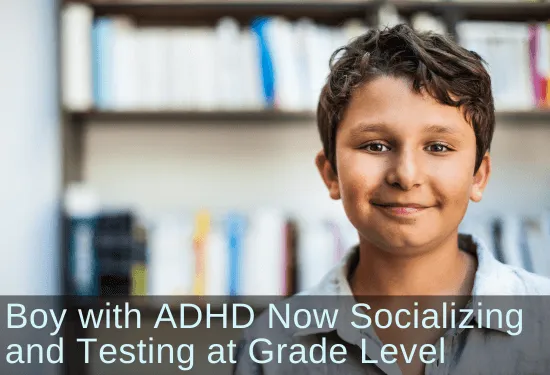Primitive Reflex Integration Case Studies
Boy with ADHD and OCD: No Longer “That Different Kid”
Parents are “joyfully amazed” as 10-year-old boy makes big gains in academics, social engagement, coordination, and stamina with primitive reflex integration activities.
This boy—diagnosed with moderately severe ADHD, a receptive language disorder, and obsessive compulsive disorder—struggled with staying calm and getting along with others, as well as poor gross motor skills. In addition, he was testing up to two years below grade level. His mom had tried a range of therapies without much success, and then tried rhythmic movements and primitive reflex integration. See how neurodevelopmental movements helped him make great strides in all of these areas!
Submitted by Beth Dougherty, mom

| Before | After |
|---|---|
| History of testing up to two grades behind | Testing at grade level in every area except one |
| Struggled being calm | Much calmer |
| Struggled with gross motor skills | Able to catch a ball, has better balance, riding a bicycle |
| Struggled getting along with others | Joining activities with more awareness of his behavior around others |
Editor’s Note: Andy, the boy in this case study, was 10 years old when Sonia Story had the pleasure of meeting Andy and working with him for a single session during a demonstration in a neurodevelopmental movement training course for parents and professionals. Andy’s tutor attended the training by Sonia Story, and the tutor and Beth D., Andy’s mother, together began implementing neurodevelopmental and integrative movements with Andy. Beth wrote this letter to Sonia Story after doing the movements and activities at home with Andy for 4.5 months.
Dear Mrs. Story:
Thank you for taking the time to assess my son Andy’s reflex integration needs. I would not have believed the effectiveness of the reflex integration without actually witnessing the changes in him during the past four months.
We have tried to help Andy in every way possible without regard to expense. He was already a bright and happy child, but had been diagnosed with moderately severe ADHD, a receptive language disorder, and obsessive compulsive disorder. We have tried every conventional therapy offered by the medical community to help him as well as tutoring.
Now, in conjunction with cognitive therapy, we practice the reflex integration exercises five days a week. I have also started some hugging exercises in the morning before he goes to school to help him feel secure and relaxed. We are seeing great gains since we started your exercises. I can literally feel him calming down as he does the exercises. The exercises have offered us a bonding time and we try to have fun while working on them.
I am amazed at the things he has accomplished as a result of the reflex integration exercises, including catching objects being thrown to him. His balance has improved and he enjoys riding his bicycle without encouragement to do so.
Most importantly, for the first time since he began school, he now tests at grade level in every area except one. And the one was only two points off. This is after testing as low as two grade levels behind in previous years. We are joyfully amazed and the improvement has come just in time before he starts middle school.
Socially we are seeing changes. Andy has begun to join in activities at Boy Scouts and with friends at school. We are beginning to see some maturing and consciousness of himself around other people making him more socially acceptable to others and not that “different kid”.
Thank you, thank you, you have given us a means of helping our son and given us hope for his future education and successful life.
Sincerely,
Beth Dougherty
Boise, Idaho, May 31, 2008
[Emphasis added]
*Disclaimer: The activities in the Brain and Sensory Foundations curriculum make use of the natural processes of neuroplasticity and development that are innately wired in the design of human beings to promote maturity and function. These activities appear to calm, organize, and mature the neuro-sensory-motor systems just as we see in the healthy development of human infants. Individual results may vary, and we do not claim to offer a diagnosis or cure for any specific condition or disorder. The Brain and Sensory Foundations activities appear to improve overall functioning resulting in measurable improvements for a range of conditions as demonstrated in over 1800 case studies from participants.

